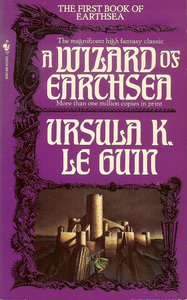Take a photo of a barcode or cover
adventurous
emotional
inspiring
reflective
fast-paced
Plot or Character Driven:
A mix
Strong character development:
Yes
Loveable characters:
Yes
Diverse cast of characters:
Yes
Flaws of characters a main focus:
Yes
As I was reading this, I thought I would end up giving it a 3 or a 3.5-star rating, but that ending... whoa.
Published in 1968, this book follows a young man known as Sparrowhawk who lives in his small village and has untapped potential for magic. He’s taken in by a wizard named Ogion and is given his true name, Ged. We follow Ged from arrogant youth, learning from the error of his ways, to wise adult, who grows to understand the nature of magic and the world’s balance.
At first, the writing didn’t really vibe with me. It’s a small book covering a long span of time, so the pacing was too fast for my taste. I’m more into small details and long conversations while this book gives more generalized summaries when not super-important to the plot. The writing does get really cool during the big events, like with Ged summoning the spirit and him fighting the dragon. The ending hooked me right in. My visual brain kicked into overdrive and I ate it up right until the last page. I won’t spoil it, I highly recommend you check it out for yourself.
Considering it was 1968 when this was published, I was surprised when about halfway into the book, it was revealed that Ged was a person of color! A lot of characters, in fact, were people of color. (Though, I haven’t read the other books yet, I’ve come to learn that nearly everyone, save for Tenar, are people of color.) As someone who vaguely remembers that sad pile of a mini-series adaptation and the Studio Ghibli film, I was so overjoyed (and sad, because whitewashing is still a problem even over fifty years later). It would be absolutely amazing if they could make a true adaptation of Earthsea now. It really is my jam—character-driven story, great character development, a fantastic ending. Forget Winx and Last Airbender, I wanna see Ged played by an actor of color!
I will definitely be reading the next books in this series (maybe if I knock on their doors hard enough, a studio exec will let me adapt this) XD
Published in 1968, this book follows a young man known as Sparrowhawk who lives in his small village and has untapped potential for magic. He’s taken in by a wizard named Ogion and is given his true name, Ged. We follow Ged from arrogant youth, learning from the error of his ways, to wise adult, who grows to understand the nature of magic and the world’s balance.
At first, the writing didn’t really vibe with me. It’s a small book covering a long span of time, so the pacing was too fast for my taste. I’m more into small details and long conversations while this book gives more generalized summaries when not super-important to the plot. The writing does get really cool during the big events, like with Ged summoning the spirit and him fighting the dragon. The ending hooked me right in. My visual brain kicked into overdrive and I ate it up right until the last page. I won’t spoil it, I highly recommend you check it out for yourself.
Considering it was 1968 when this was published, I was surprised when about halfway into the book, it was revealed that Ged was a person of color! A lot of characters, in fact, were people of color. (Though, I haven’t read the other books yet, I’ve come to learn that nearly everyone, save for Tenar, are people of color.) As someone who vaguely remembers that sad pile of a mini-series adaptation and the Studio Ghibli film, I was so overjoyed (and sad, because whitewashing is still a problem even over fifty years later). It would be absolutely amazing if they could make a true adaptation of Earthsea now. It really is my jam—character-driven story, great character development, a fantastic ending. Forget Winx and Last Airbender, I wanna see Ged played by an actor of color!
I will definitely be reading the next books in this series (maybe if I knock on their doors hard enough, a studio exec will let me adapt this) XD
adventurous
emotional
medium-paced
Plot or Character Driven:
Character
Strong character development:
Yes
Loveable characters:
Complicated
Diverse cast of characters:
No
Flaws of characters a main focus:
Yes
reflective
slow-paced
adventurous
fast-paced
Plot or Character Driven:
A mix
Strong character development:
Yes
Loveable characters:
No
Diverse cast of characters:
Yes
Flaws of characters a main focus:
Yes
adventurous
emotional
mysterious
reflective
medium-paced
Plot or Character Driven:
Character
Strong character development:
Yes
Loveable characters:
Yes
Diverse cast of characters:
Yes
Flaws of characters a main focus:
Yes
adventurous
emotional
hopeful
mysterious
reflective
relaxing
fast-paced
Plot or Character Driven:
Character
Strong character development:
Yes
Loveable characters:
Yes
Diverse cast of characters:
Yes
Flaws of characters a main focus:
Yes
medium-paced
Interesting, though I need some worldbuilding clarity and I'm still not quite sure of what happened in the ending. (Did the necromancy spell just split his soul into evil and good and with his true name he was finally able to reunite himself? Or by knowing himself, he was able to name the evil and absorb it into himself again? Perhaps that is part of what makes it a great novel? Still, I can see why this author is considered in the same breath as Tolkien and Lewis, and how it's ramifications on the fantasy genre can still be heard today (I'm looking at you Eragon).
I don't think Le Guin's fiction is for me. This was a great book and tremendously imaginative, but for some reason I can't quite put my finger on, I wasn't particularly immersed in the story. I'm aware this is entirely an issue with me as a reader, which is why I'm giving it 4 stars. Maybe I'm just in a weird mood and this was the wrong time to read this. The narration style made me feel kept at a distance and there was barely any downtime. This is a very fast-paced book, and the parts I tend to enjoy the most are the quiet moments of intimacy between characters. There are a few of those, but the moments in which the characters are together never last long enough for me to develop any attachment to them. If you like adventure books with a lot of magic and action, you may love this, but I couldn't.
I'm actually a bit upset because from the interviews with Le Guin I've seen, she was a formidable woman and I really wanted to like her writing. I enjoyed [b:The Lathe of Heaven|59924|The Lathe of Heaven|Ursula K. Le Guin|https://i.gr-assets.com/images/S/compressed.photo.goodreads.com/books/1433084322l/59924._SX50_.jpg|425872] but DNFd [b:The Left Hand of Darkness|18423|The Left Hand of Darkness (Hainish Cycle, #4)|Ursula K. Le Guin|https://i.gr-assets.com/images/S/compressed.photo.goodreads.com/books/1488213612l/18423._SY75_.jpg|817527], so there may be other books of hers I'd like, but I think for now I may direct my attention towards her essays.
I'm actually a bit upset because from the interviews with Le Guin I've seen, she was a formidable woman and I really wanted to like her writing. I enjoyed [b:The Lathe of Heaven|59924|The Lathe of Heaven|Ursula K. Le Guin|https://i.gr-assets.com/images/S/compressed.photo.goodreads.com/books/1433084322l/59924._SX50_.jpg|425872] but DNFd [b:The Left Hand of Darkness|18423|The Left Hand of Darkness (Hainish Cycle, #4)|Ursula K. Le Guin|https://i.gr-assets.com/images/S/compressed.photo.goodreads.com/books/1488213612l/18423._SY75_.jpg|817527], so there may be other books of hers I'd like, but I think for now I may direct my attention towards her essays.
Ged lifted his face and gazed at that remote bright crescent in the west.
He gazed for a long time, and then he stood up erect, holding his staff in his two hands as a warrior holds his long sword. He looked about at the sky, the sea, the brown swelling sail above him, his friend's face.
[...] Then he bent over and hid his face in his arms, weeping like a boy.
He gazed for a long time, and then he stood up erect, holding his staff in his two hands as a warrior holds his long sword. He looked about at the sky, the sea, the brown swelling sail above him, his friend's face.
[...] Then he bent over and hid his face in his arms, weeping like a boy.





